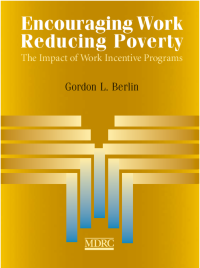Encouraging Work, Reducing Poverty
The Impact of Work Incentive Programs
Even as the nation debated welfare dependency throughout the early 1990s, many welfare recipients entered jobs only to find themselves no better off for being employed: Starting wages were often lower than welfare payments, and welfare benefits disappeared almost dollar-for-dollar with new earnings. Policymakers in Wisconsin, Minnesota, and Canada took steps to turn this situation around. Their idea, which took shape in Milwaukee's New Hope Project, Minnesota's Family Investment Program, and Canada's Self-Sufficiency Project, was to "make work pay" by supplementing low-wage workers' earnings with cash payments, supporting them when they worked rather than when they did not. This report synthesizes early evidence on the effectiveness of these programs, demonstrating that they increased employment, earnings, and income; lowered the fraction of families with below-poverty-level incomes; and improved the well-being of children. It also cautions that incentive programs generally cost more than traditional welfare-to-work programs.






